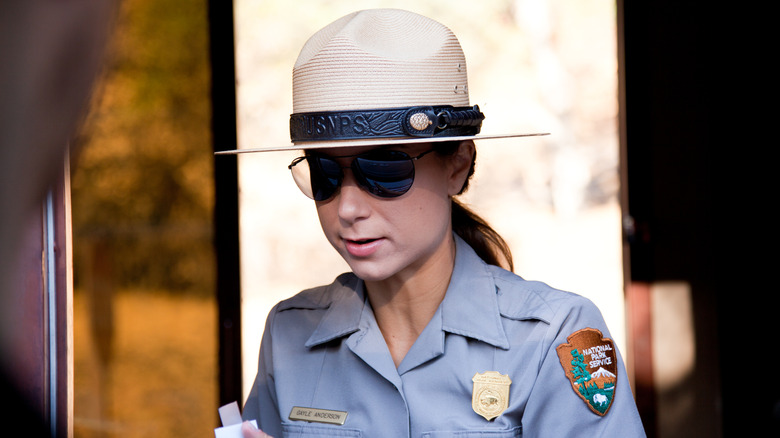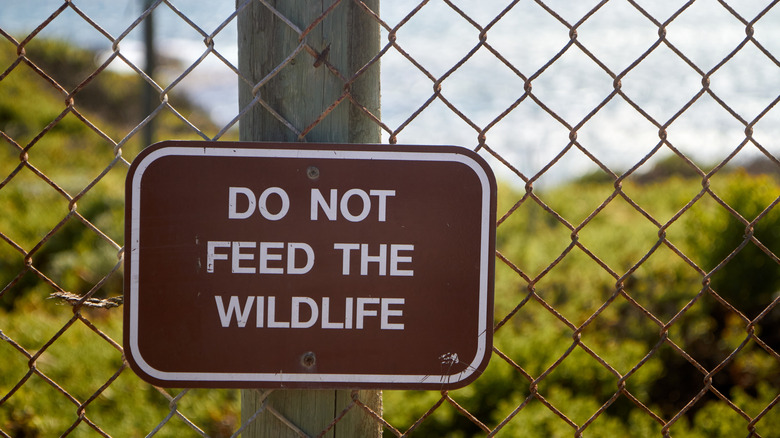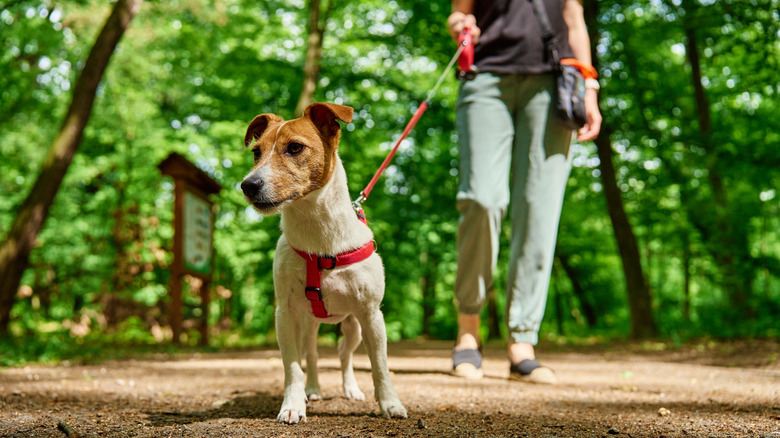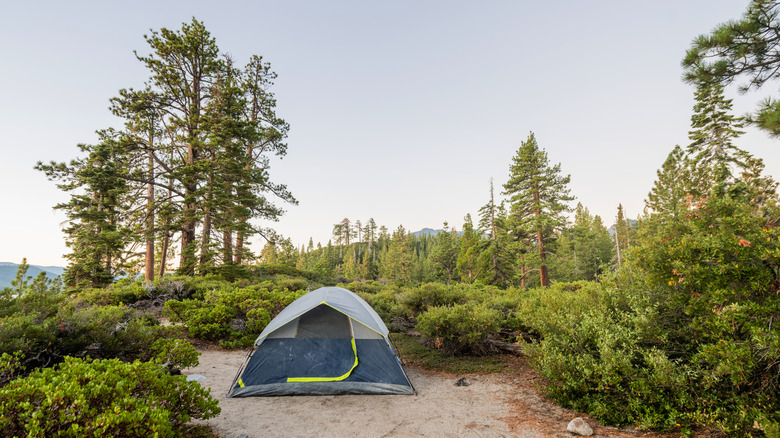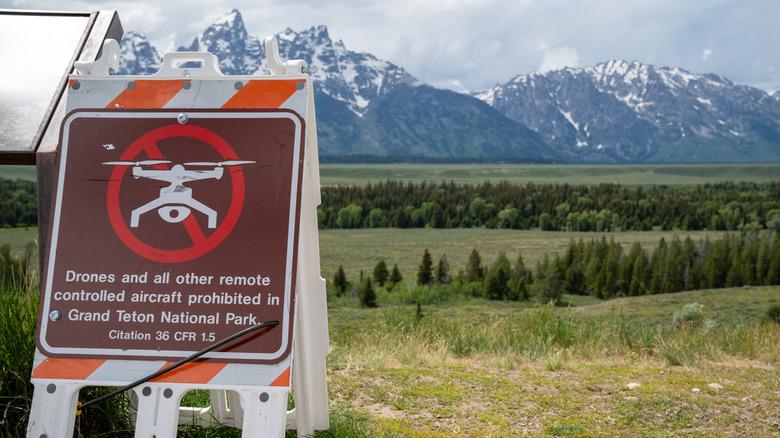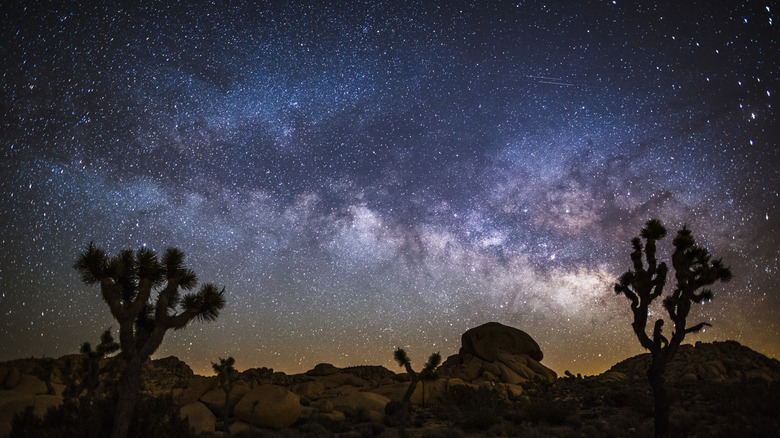Federal Crimes You Had No Idea You Committed When Visiting US National Parks
Every year, millions of people visit America's national parks for adventure, escape from city life, peace, and connection to nature. The geography and features of the parks system is vast, offering plenty of opportunities. Visitors can experience wild camping excursions, paddle through glacial lakes, rock climb granite monoliths, or simply sit and watch the wildlife. These wild spaces are an escape for many, and can often come with a sense of freedom, a sense that you're far from everyday rules and regulations of daily society.
But despite this feeling of freedom and how remote or untouched certain areas of a national park might feel, the laws still apply. In fact, in certain situations they apply more strictly within the park than out. That's because national parks are federal land, and violations of the laws within their borders can be considered federal crimes. Some of these laws seem obvious to most, such as vandalizing or defacing any part of a national park. Other restrictions can feel less intuitive. Did you know it is illegal to hang a lantern from a tree in Joshua Tree National Park? Or that you can't ride your bike with an open beer in hand? Even relatively harmless actions can lead to citations, fines, or even jail time.
Enforcement of the rules can occur even after visitors have left the park grounds. Park officials can and do retroactively issue charges, especially when proof of the illegal behavior has been posted on social media. The national park service notes it is up to the public to inform themselves of these laws and regulations. Here are some of the lesser known rules that could land you in federal legal trouble in a national park.
Unexpected food and drink rules of the outdoors
When it comes to food and drink in a national park, a casual mistake could become a legal issue. Cracking open a cold beer while on vacation or after a long day in the mountains is a common and enjoyable experience for many, but you'll have to make sure you aren't doing it while on two wheels. Under federal regulations, it is illegal to ride a bicycle with an open container of alcohol in any national park. At the end of the day, wheels and alcohol still don't mix, and a casual pedal with a drink in hand could lead to a citation. Similarly, while using marijuana might be legal in some states, it's still illegal federally, so it's banned in all national parks. Cannabis use, possession, and distribution are prohibited under federal law, which takes precedence over state legislation.
Most parks have strict fishing regulations around where, when, and how you fish, but what is less known is how you throw out the remains of a fish. Say you've made a great catch and plan to eat it for dinner, so you fillet the fish in the boat. Don't simply throw the fish remains back in the water. Federal law prohibits discarding fish parts within 200 feet of docks, designated swimming areas, or developed areas, unless otherwise stated.
Another mistake is feeding wildlife. While it might seem harmless at first, doing so is dangerous for animals, so it's actually a federal offense. Feeding animals, even unintentionally, can change their behavior and threaten their natural habitat, and potentially make it unsafe for future visitors.
Pets, noise, and animal encounters
Everyone wants to bring their furry friend on their outdoor adventures, but bringing them to a national park can come with strict rules. According to the Code of Federal Regulations, pets need to be leashed at all times, with a leash that is six feet or shorter, otherwise they need to be crated. This applies whether you are on a hiking trail, in your personal campsite, or parked at a scenic viewpoint. The noise your pet makes matters too. It's a violation to allow your pet to make "unreasonable" noise, especially if it disturbs wildlife or other visitors. Barking, howling, or whining can scare the wildlife and disrupt these natural spaces.
In some parks, pets are banned from certain activities. Grand Canyon National Park, for example, bans dogs or cats on white water river trips. In Grand Teton National Park, dog sledding and skijoring (where pets pull skiers) are both banned. As with most rules, they are enforced to protect the safety of all involved.
It is another federal offense to tease, touch, frighten, or disturb animals and wildlife in the parks, especially if they are mating or breeding. In some cases this has led to jail time, for example in the 2018 case of a man's arrest in the park on everyone's camping bucket list, Yellowstone National Park, after he was caught on video harassing a bison. He was sentenced to 130 days in jail, as Yellowstone regulations advise people not to approach any animal and to stay at least 25 yards away from bison.
Camping and trail etiquette
Camping in national parks can often mean going off-grid, but that does not equate to going off-rules or off-trails. The National Park Service enforces specific regulations around where and how visitors can camp, and even how they move through the backcountry.
While most of us are aware and understand that it is illegal to leave a fire unattended, one of the lesser known rules is that you cannot set up a tent without sleeping in it the first night. Since visitation numbers to national parks are skyrocketing, many people find it challenging to reserve a campsite, especially those that are first come, first served, and that should be booked far in advance. A hack campers have tried is to set up a tent early to reserve the spot, perhaps before a friend gets there, but that's not allowed at some parks. According to NPS, "sites not occupied for 24 hours will be considered abandoned and property will be impounded."
Certain hygiene habits are also restricted: It is illegal to wash dishes, food, clothing, or yourself for that matter, at public water spigots, fixtures, or pools, unless those areas are specifically designated for those purposes. That means rinsing out your cookware in a bathroom sink or under the water spigot at a campground could get you fined.
Trail use has an interesting rule as well: If you're on horseback, you're not allowed to pass hikers or bikers at anything faster than a slow walk. This includes pack animals too. If you're on foot, it's illegal to take an undesignated shortcut, or to intentionally obstruct a trail, block the path, or disrupt the safe passage of another.
Disorderly conduct, nudity, and other strict rules
Whether they involve wildlife, trails, or camping gear, many national park violations are about visitor behavior. Disorderly conduct is broadly defined by NPS as any act intended to cause public alarm, nuisance, or risk, which includes obscene gestures, offensive language, and disruptive or threatening behavior. That means swearing loudly, shouting to fellow hikers, or making threatening gestures could land visitors with a citation. Even the volume of your voice matters, and if noise levels are deemed "unreasonable" for the area, rules can be enforced.
While there is no federal legislation around nudity in public parks, it is prohibited in certain national parks. In Kaloko-Honokohau National Historical Park in Hawaii, for example, nudity is illegal unless the visitor is under the age of 10. This includes all areas, no matter how remote or empty they seem.
Tossing pebbles or rocks might seem harmless at first, but rolling, tossing, or launching objects down hills, mountain sides, or canyons is also prohibited in all national parks. The rule exists for a solid reason: Falling objects and dislodged rocks can injure visitors, particularly in places that have a lot of loose rocks, large and small.
Drone usage is another federal no-no. Unless you have a required permit, the use of drones or operation of unmanned aircrafts is banned in nearly all national parks due to noise, safety, and wildlife disturbance concerns.
Park specific, hyperlocal, and quirky offenses
Some national park regulations are so specific they can catch visitors off guard. Take Sequoia & Kings Canyon National Parks, for example, where it is prohibited to possess bear spray, even though bears are an integral part of the park's ecosystem. In Shenandoah National Park, backcountry campers are required to have a camping permit, and must follow strict group-size regulations, with no more than 10 people per group. Sorry, no massive parties in the backcountry in Shenandoah!
In Joshua Tree National Park, it's prohibited to hang lanterns or other objects from park vegetation, to protect the fragile desert ecosystem. This helps to make this park one of the top ranked U.S. campsites for the best stargazing. The park also prohibits the possession of inflated balloons without a permit, due to the risks they create to wildlife and the environment. Perhaps Joshua Tree isn't the best place for a party either.
If you dream of guzzling water from a natural spring in Hot Springs National Park in Arkansas, then go for it. Visitors are allowed to collect as much spring water as they would like for personal use, but it is a federal offense to sell the water.
Other park-specific rules get even more quirky. Take Death Valley National Park, where it is illegal to attempt childbirth in the natural Saline Warm Springs. In Everglades National Park, producing more than four fish fillets per person in the park is illegal. And if you don't follow the rules of burying your human waste while visiting Shenandoah, then you're in deep doo-doo yourself. Remember these rules the next time you're visiting the top natural wonders in your state.
